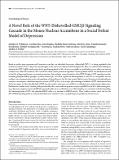A Novel Role of the WNT-Dishevelled-GSK3β Signaling Cascade in the Mouse Nucleus Accumbens in a Social Defeat Model of Depression
Author(s)
Wilkinson, Matthew B.; Dias, Caroline; Magida, Jane; Mazei-Robison, Michelle S.; Lobo, Mary Kay; Kennedy, Pamela J.; Dietz, David M.; Covington III, Herbert E.; Russo, Scott; Ghose, Subroto; Tamminga, Carol; Nestler, Eric J.; Neve, Rachael L.; ... Show more Show less
DownloadWilkinson-June 2011-A Novel Role of the.pdf (1.367Mb)
PUBLISHER_POLICY
Publisher Policy
Article is made available in accordance with the publisher's policy and may be subject to US copyright law. Please refer to the publisher's site for terms of use.
Terms of use
Metadata
Show full item recordAbstract
Based on earlier gene expression and chromatin array data, we identified the protein, dishevelled (DVL)-2, as being regulated in the nucleus accumbens (NAc), a key brain reward region, in the mouse social defeat model of depression. Here, we validate these findings by showing that DVL2 mRNA and protein levels are downregulated in NAc of mice susceptible to social defeat stress, effects not seen in resilient mice. Other DVL isoforms, DVL1 and DVL3, show similar patterns of regulation. Downregulation of DVL was also demonstrated in the NAc of depressed humans examined postmortem. Interestingly, several members of the WNT (Wingless)-DVL signaling cascade, including phospho-GSK3β (glycogen synthase kinase-3β), also show significant downregulation in the NAc of susceptible, but not resilient, mice, demonstrating concerted regulation of this pathway in the NAc due to social defeat stress. By using viral-mediated gene transfer to overexpress a dominant-negative mutant of DVL in NAc, or by using a pharmacological inhibitor of DVL administered into this brain region, we show that blockade of DVL function renders mice more susceptible to social defeat stress and promotes depression-like behavior in other assays. Similar prodepression-like effects were induced upon overexpressing GSK3β in the NAc, while overexpressing a dominant-negative mutant of GSK3β promoted resilience to social defeat stress. These findings are consistent with the knowledge that downregulation of DVL and phospho-GSK3β reflects an increase in GSK3β activity. These studies reveal a novel role for the DVL-GSK3β signaling pathway, acting within the brain's reward circuitry, in regulating susceptibility to chronic stress.
Date issued
2011-06Department
Massachusetts Institute of Technology. Department of Brain and Cognitive SciencesJournal
Journal of Neuroscience
Publisher
Society for Neuroscience
Citation
Wilkinson, M. B. et al. “A Novel Role of the WNT-Dishevelled-GSK3 Signaling Cascade in the Mouse Nucleus Accumbens in a Social Defeat Model of Depression.” Journal of Neuroscience 31.25 (2011): 9084-9092. Web. 8 Feb. 2012.
Version: Final published version
ISSN
0270-6474
1529-2401